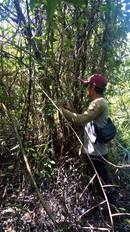News

Myanmar has a long tradition in Forest Inventory and is among first countries in the world that historically had established sample-based large area forest inventories. The first National scale forest inventory was established in 1980/81 with the funding from UNDP/FAO as first phase and second phase until 1992. However, the National Level Forest Inventory was not able to fully finish for a number of different reasons.
To support the National Scale Forest Inventory, FAO UN-REDD Programme has been working together with the Forest Department, Ministry of Natural Resources and Environmental Conservation, since 2015. In 2016, FD had endorsed the National Forest...
Significant advances in designing and planning of a National Forest Inventory (NFI) in Myanmar
19/04/2019
19/04/2019

A prime source of information about the state of the forests globally is the National-scale Forest Inventories (NFIs) at country level. In this context, FAO since its foundation in 1945, is helping countries in establishing and improving national capacities in collecting data on forests and monitoring the changes over time. Currently, FAO works in around 45 countries, including Myanmar, supporting the development and upgrading of their National Forest Monitoring Systems (NFMS). The objective of this endeavor is to enable countries to produce robust forest information in order to provide updated and reliable data for sound forest policy planning and evaluation...

The Climate Resilient Green Economy (CRGE), Ethiopia’s national strategy to achieve a middle-income status by 2025 has “Forestry: Protecting and re-establishing forests for their economic and ecosystem services, including as carbon stocks” among one of the four pillars of Ethiopia’s green economy. In order to support national and regional decision-makers and actors responsible for planning and managing forests and related resources in Ethiopia, Food and Agriculture Organization of the United Nations (FAO) under the UN-REDD Programme published a set of guidelines that focus on promoting sustainable management of Ethiopian forests. The publications were produced in collaboration with the Center for...

The Swedish International Development Cooperation Agency (Sida), the Food and Agriculture Organization of the United Nations (FAO) and the Economic Community of West African States (ECOWAS) have joined forces to protect West Africa's forests and help safeguard the livelihoods of millions of people who depend on them.
The three institutions will carry out a five-year project aimed at strengthening sustainable forest and land management, addressing transboundary forest threats, maximising the livelihoods of forest-depended communities, and building climate resilience across 15 countries in West Africa.
The project - to be implemented by ECOWAS with financial support of over $8 million from Sida and technical...
Voices from the field: Sustainable Forest Management through Community Forestry in Colombia
04/04/2019
04/04/2019

Local communities are key forest stakeholders, and their involvement in decision-making and sustainable management of forests generates positive outcomes for livelihoods, rural development, and forest conservation. In particular, countries in Latin America are advancing in the process of developing the concepts of community forestry as a collaborative governance approach to forest management. The approach is also a crucial part of countries’ efforts to reduce emissions from deforestation and degradation (REDD+) and contribute to national and global action to combat climate change. For example in Colombia, it has been estimated that more than one million people depend on forests for their...

